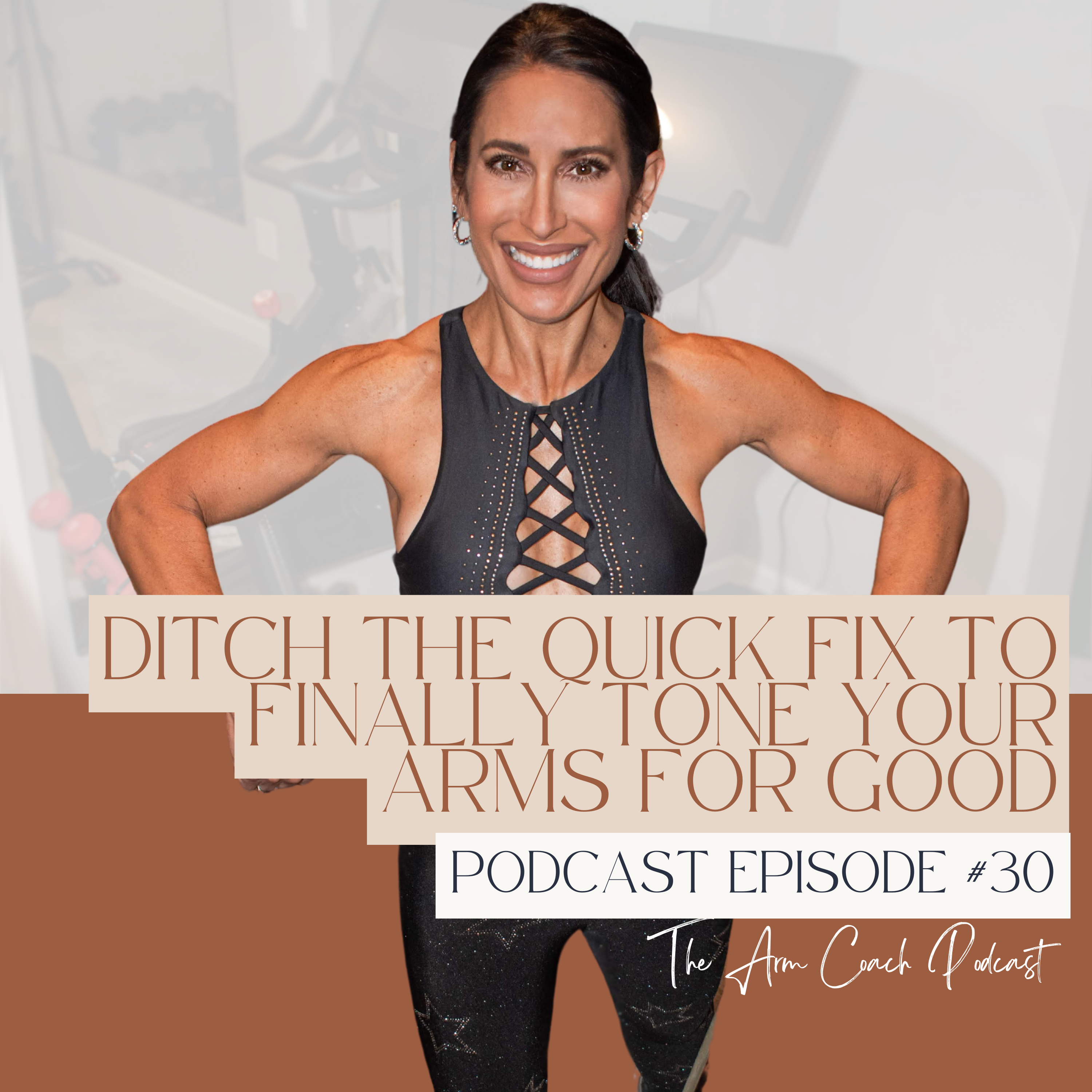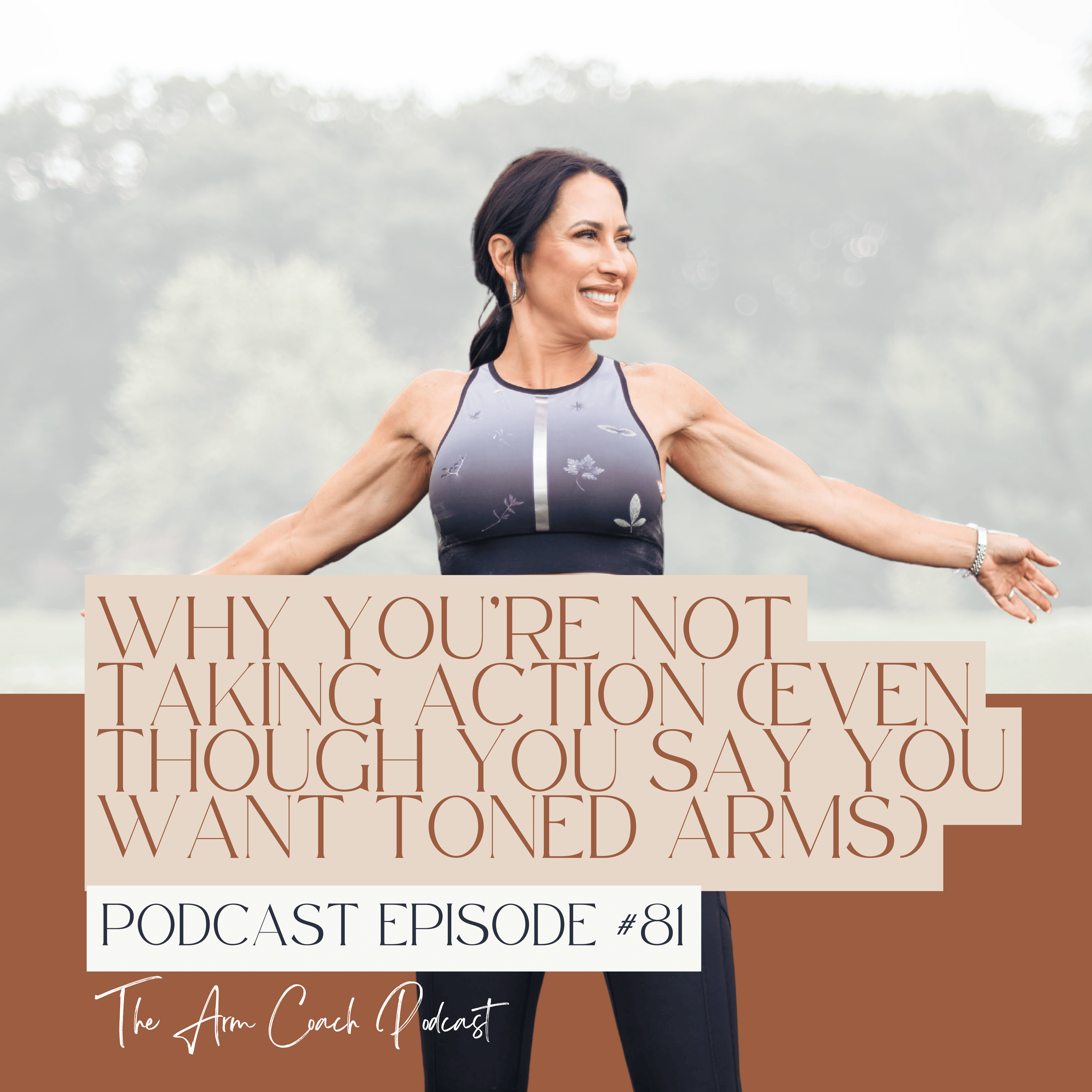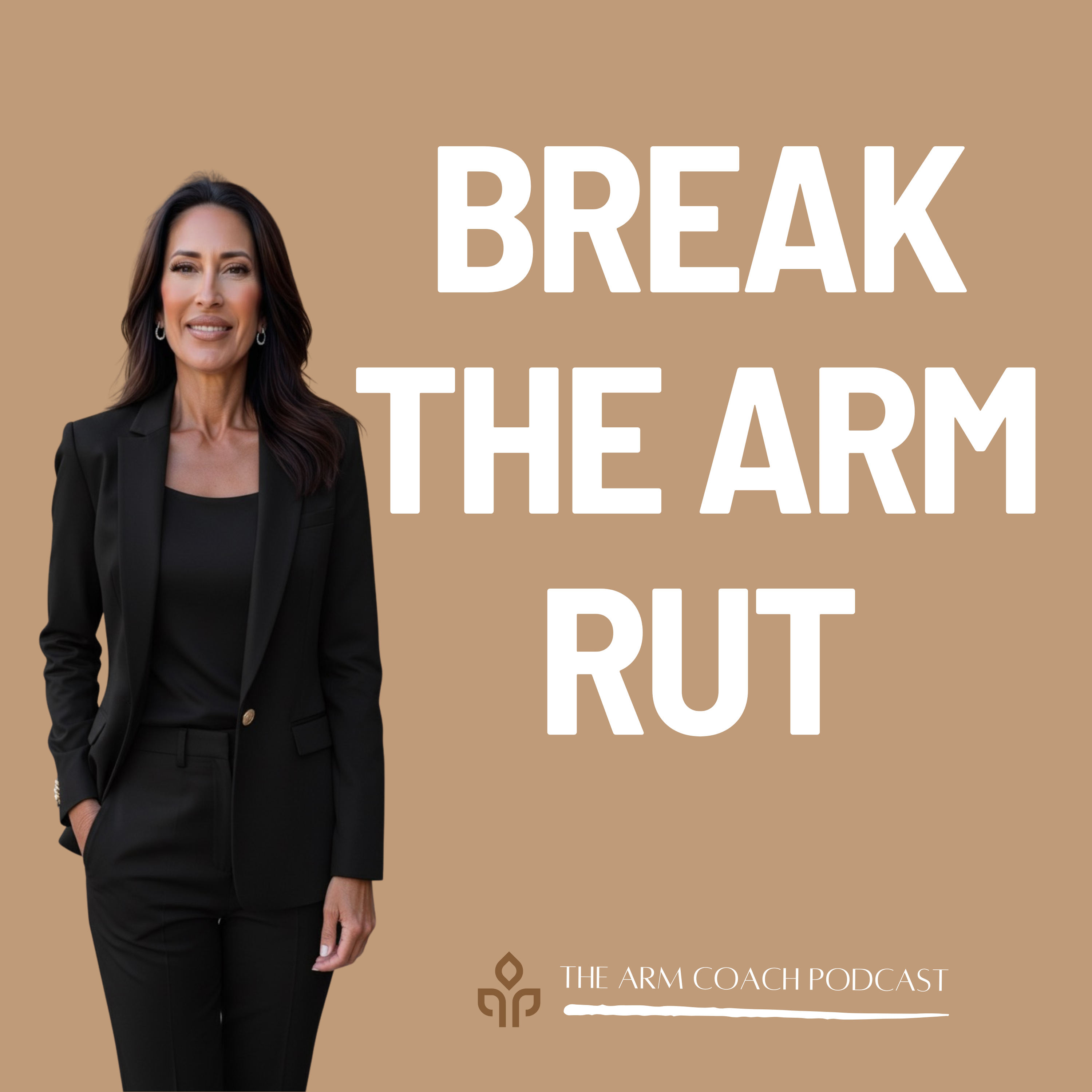Episode Transcript
If you’ve ever wondered what to eat to tone your arms—or found
yourself making food choices based on cravings, convenience, or
emotion—this episode is for you.
Today, I’m pulling back the curtain on how the way you eat impacts the
way your body, especially your arms, look and feel. We’ll explore how
your daily decisions around food are either helping you feel lean, light,
and strong—or keeping you stuck in cycles of bloat, frustration, and
self-doubt.
Hey everyone! Welcome to The Arm Coach podcast, episode 58! Here's
what we're going to talk about today. We're going to answer all of these
questions that you probably have about what to eat—especially if you're
working on toning your arms and want your food to support the strong,
sculpted look you're after. We're going to talk about how you make
choices right now about what to eat, whether they're conscious choices,
or whether they're unconscious choices—and how those decisions
directly impact your energy, your weight, and yes, the way your arms
look and feel. We're going to talk about why it's better to bring this
decision back to your higher brain by deciding ahead of time, especially
if your goal is to feel lean, strong, and in control. And we're also going
to talk about what happens if you don't decide and if you just decide to
wing it and do whatever comes up and just try to be spontaneous. We're
going to talk about what problems you probably encounter when you do
decide what to eat—especially when you want toned arms but still feel
pulled toward the foods that keep you stuck. And I’ll share one of my
own food struggles—how I used to go back and forth on what to eat, and
how I finally made peace with food in a way that allowed my body to
feel good and look toned and strong. And we're going to end with
helping you understand what to ask yourself to make better eating
decisions going forward—so they support your desire for beautifully
toned arms, your energy, and your confidence. That's your goal to make
it easy. So let's dive in right now, and first talk about how you do make
choices about what to eat.
It's pretty varied, right? You may decide what to eat based on
what you read online, or hear in the news, or in a book that you
read. And you may follow and decide based on what you think is
good for you. Or what you see somebody else eating. Or you
might just see a visual, a picture of a food or a food in a
restaurant, or a food in the window of a store. Or smell
something that smells good. And all those things are going to
influence your choices. And these influences create a desire in
you. It's a want, it's a desire. And, sometimes you just want to
eat for fun, for pleasure. What will taste good right now to you?
Some of these ways that you eat right now are very clear and
they’re on the front burner for you. You're very aware of them.
And this is when you think about it ahead of time, and you say,
‘You know, where will I be today for lunch? What will I be doing?
What am I most likely to eat?’ But some of your food choices are
going to be unconscious. Like when you see a post on Instagram
for something and you suddenly get a craving and you feel like
going out and getting it. So sometimes you make your food
choices based on your emotions. If you're an emotional eater,
you know exactly what I mean. You may choose foods that help
you dull an emotion that is uncomfortable to you. And that you
probably have not allowed yourself to feel in such a long time,
that it becomes a very, very strong drive to avoid that emotion.
You don't want to go there. Or maybe you eat like a child, and
you choose your food kind of defiantly. And you think ‘No one
can tell me I can't have this’. Or ‘if I don't eat this I'm going to be
deprived’. Now, all in all, the way that you're probably deciding
what to do, can be very, very random, with no real rhyme or
reason. And if you eat randomly, that leads to random results.
Very inconsistent results. And remember, we're here to deal with
your body, your arms, your weight, all those things related to your
eating, so random inconsistent results are not what you want. If
you want your body—especially your arms—to reflect the
strength and tone you're working toward, you need to guide your
eating with intention. Sometimes you might be eating for
nourishment. Sometimes to entertain yourself. Sometimes out of
habit. All these different reasons, all these different drivers, are
going to lead you to different food choices. Now, some of them
are in your favor and get you where you want to go. Some of
them are not. If you want to eat more foods that are helpful to
your body and to your life, this randomness doesn't work. I am
definitely not saying that you need to be on a rigid food plan, but
it really does help to have some guidelines to help you make
decisions and to guide you when you choose the foods that you
want to eat. Right now, I'm guessing that the randomness of
whatever happens to come up, is the way that you've been
going. And when you do that, it can almost feel like you're in the
ocean floating around and being tossed around by really strong
waves, and you have no say over where you end up. You know, it
depends on who you're with, or what the restaurant is serving, or
what they have at the party. It's not up to you. Which is not true,
but that's what it feels like. That's why I believe that it's really
good to decide ahead of time what foods work for you. And to
have a soft plan for how you'll eat. It's like making one really big
overarching decision about your food and your eating, and that
decision will make all the small, daily, and many times a day
decisions much easier. So it's not going to matter if you're going
to a friend's house or to a buffet or into a restaurant. I have many
clients who fear going to restaurants and they worry about each
individual meal in a restaurant. But if you have an internal plan,
that I'm just making this up, that for most dinners, you eat some
protein and some vegetables and a salad. That simple plan, that
simple template, can give you tons of choice in terms of what
actual foods you'll eat. But you don't have to know the exact
foods before you sit down at the table. But you have the
overarching plan. You'll know that this is how you're going to do
it, so there will be no stress, and no big decisions. Now when you
decide anything ahead of time, when you visualize it, and you
make a plan for what you think you should do, it's always your
higher brain that's in charge of making this plan. And this part of
your brain is great at making decisions for you. And it has your
best interests in mind. So you're good to go if you're thinking
ahead. But when you don't pre think what you’ll eat, your lower
brains then going to be in charge. And it's going to choose based
on two things. One is the habit of what you're used to eating, and
the way you're used to eating, and the way you're deciding. The
habit of what you've always done. It's hard to get out of that. It's
like a rut in a road. The other thing that it will be based on if you
don't pre think what you’ll eat, is what will give your brain the
biggest reward. And in the world of food, the biggest rewards
come from sugar and alcohol. So these foods are not necessarily
where you want to focus most of your eating time. But if you
don't plan ahead, this may be what you end up choosing.
Now, there's two problems you might encounter if you choose
what you’ll eat in the moment, without any thought ahead. One is
that you may not be acting in your best interest. You'll choose
randomly, and as a result, you're going to be frustrated with the
end results of eating that random food. Or you'll make emotional
choices instead of higher brain choices. And I’ll give you some
examples. Every time you need to decide what to eat, and
remember, first you're always checking in to make sure you're
physically hungry. There are a lot of factors, every time you
decide. And you want this to be a really clean decision, based on
what's best for you and what your body truly needs. You don't
want to be making food decisions based on thoughts of
deprivation, or fears of not getting enough, one of the most
common fears many of us have. You also don't want to let your
inner, three year old child, decide for you. If you want to eat
something because you think it's not allowed, and you're feeling
rebellious, you're working against yourself. And you are smarter
than that. Now let me give you some of my own examples. I'm
going to pull back the curtain and tell you one of my struggles in
this area that I only recently solved. I was told years ago after
feeling sick for a very long time, severe bloating and constant
runny nose, that I had a sensitivity to lactose and nuts. I found
this out years ago. So periodically, I would go through days or
weeks or months when I was very strict with myself, and I didn't
eat them physically. I felt really good, but mentally and
emotionally, I never made peace with that fact. I never made
peace with the fact that those foods were not good for me. So I'd
go on and on for a little while and then I would rebel, and I would
argue with reality. And I would tell myself that I was deprived.
Well, what do you do when you're deprived? When I felt
deprived, I’d eat whatever I wanted. Cheese and peanut butter,
all the things that my particular body didn't do well with. And
then I would repent and clean up my act. But in addition to
repenting and cleaning up my act, I also told myself how
ridiculous I was. And what was wrong with me. And why wasn't I
being smarter. I really did a good number beating myself up,
because I knew intellectually what I should do, but I wasn't
making a good choice. And this was repeated again and again
and again through years. I was frustrated, and I was
embarrassed that I could not solve my own problem. And then I
started to look at my thinking about not eating lactose or nuts
and I uncovered some pretty typical, and interesting thoughts.
‘It's not fair. It's just a little bit, not going to hurt me’, or ‘I don't
really have any terrible symptoms, maybe it's not a big deal’. And
the big main thought always was, ‘Poor me, I'm so deprived’. I
didn't want to face reality. Because reality meant making a clear
cut decision when I decided what I was going to eat, and saying
goodbye to the kinds of foods that didn't serve me. I couldn't see
that this was a decision I needed to make for me, not a decision
against me. I wasn't deprived. And when I thought about it, I
realized that my health and my energy level, and my ability to
have full days and be a great role model of a woman who takes
care of herself, I knew that I just wasn't walking my talk. So I
finally solved my problem when I decided to say goodbye to
these foods. And once I made this big decision, all the daily, meal
by meal, decisions were easier. Now do I ever make any
exceptions? Yes. But they are rare, and they are thought out
ahead of time. And they have to be really worth it, like eating
cheese in France. Now I see situations like this all the time with
my clients. And maybe you'll relate to this. Many clients who are
just like you may have certain foods that don't do well for them.
So it's not always an allergy that I'm referring to, but it just may
be a food that doesn't give you the results that you want. So
think about you. Think about yourself. How do you do, honestly,
with sugar? How do you do when you eat bread or processed
snacks? Your reality may be that a little bit is fine, but a lot, isn't
fine. Or maybe your reality like so many others, is that once you
start eating these types of foods, it is really challenging to stop.
And yet, you don't want to say no to yourself, because you don't
want to. You don't think you should have to say no. Like me, you
don't think it's fair. And yet, for some of you, eating these foods
is like opening a door that will never close. Some foods, and I'm
talking mostly about manmade foods, like sweets and snacks
and processed carbs, they are physiologically hard to say no to.
They are hard to stop eating. And they are designed to be hard to
stop eating so that you buy more. And they make it very easy for
you to overeat, again and again and again. And yet, like me, you
may rebel against saying no to yourself, because you just think
that you should have whatever you want. The reality is that some
of us are able to have small amounts of certain foods, and some
of us will struggle to stop eating those foods. Intellectually, you
probably know that it might be easier if you didn't have to deal
with certain foods, but you're reluctant to admit that.
So let me give you some guidelines right now to help you decide
what to eat when you're thinking about your meals and your
snacks. And I do hope you generally do this ahead of time. I want
you to start asking yourself these questions. Does this food make
me feel good when I eat it? And the next question is, Does this
food make me feel good after I'm done? This question refers to
how these foods feel in your body, not so much how you feel
emotionally. Ask yourself number three. Are the foods you like
mostly pretty natural? Not made in factories. I mean the majority
of what you eat. You do not have to be a perfect eater and only
eat natural foods. But what’s the majority of what you eat. And
number four, When you eat these foods, are you able to stop
when your body is lightly satisfied. Do these foods allow you to
stop eating easily, or do they physiologically cause you to keep
craving more and more? And last, sometimes it's easier to step
out of your life, and imagine that the food that you want to eat, is
really for someone else. So if you were taking care of someone
you loved, and you wanted them to eat well and be nourished,
would you feed them this food? In this quantity? With this
frequency?
These are the questions I want you to get used to asking
yourself, when you're deciding what to eat. What you eat, most
of the time, is what creates your physical life. Your physical body.
And your body deserves some thought and energy put into
thinking about how you're fueling it. Just like you would fuel your
car. So here's what I'd like you to focus on going forward. Food
is pleasurable, but food is also fuel. If you choose food based
mostly on pleasure, you're probably shorting yourself on
nutrition, unless you are an incredible cook and can make
everything taste delicious. Now of course, you can definitely get
pleasure out of healthy food. I'm talking about that type of instant
pleasure that you get from fake, processed food. So here's what
you can do for now. Keep a simple Journal of what you eat for a
few days. Now I don't want you to do this to judge yourself or
beat yourself up. I just want you to play detective and see,
honestly, what you're feeding yourself. Is it mostly real food, or is
it mostly play food? Were you hungry when you ate it, or were
you eating because you felt some emotion? Did you feel good
after you ate, or did you feel filled with regret? Little by little, we
will come to a plan together and create your own system for
saying yes or no to any given food. Are you loving yourself with
what you're eating, or are you punishing yourself? These are
some of the things that we work on weekly in my program, Arms
By Kristine. I'm taking new clients right now, so if you’re
interested, go to thearmcoach.com for more info.


